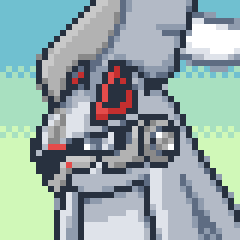Silvally
Nonbinary (he/him) ∞
- 2 Posts
- 13 Comments
There is! Donating to certain charities and/or charity funds is an effective way to fight climate change. Keep in mind some charities are more efficient than others at using their money.
I’m not sure this one is one that qualifies as effective but it is an example of what kind of things are out there: https://www.founderspledge.com/funds/climate-change-fund

 21·10 months ago
21·10 months agoHas anyone here ever thought “I would like this game more if it had encumbrance in it”? Or “I would like it if I couldn’t pick up this item right now?”
Admittedly these might not be the right questions I’m asking here as I understand there’s a “realism” and “challenge” aspect to this debate (which honestly are two things I’m just not that interested in when it comes to video games I play).
Maybe it’s a delayed gratification thing…?
I’m not trying to be accusatory, I’m just genuinely curious. Everyone has different tastes after all.
There’s something about Saints Row the Third that just tickles my funny bone.
It’s just the perfect level of absurd humour for me. It’s the first Saints Row game I played. I’ve since gone back and played Saints Row 2 and it wasn’t absurd enough for me. Saints Row IV on the other hand felt too absurd.
It’s a guilty pleasure of mine for sure.

 2·10 months ago
2·10 months agoYeah there’s certainly a debate to be had regarding whether the realism/emptiness is actually implemented well.
I haven’t played the game and am not planning to (I’m in the camp of the “realistic haunting empty space” vibe isn’t one for me, therefore this game just doesn’t interest me at all) so I won’t comment on it. But I am interested in following the discussion, so thank you for sharing your thoughts with me.

 11·10 months ago
11·10 months agoThe point about planets in general being boring and empty is an interesting one to me because ultimately I think this is either going to be a positive or a negative for people based on their personal preferences. Video games don’t have to be realistic after all. It’s fine for someone to enjoy Starfield because they like the “realistic haunting empty space” vibe, but it’s also okay for someone to not like that.
I can’t remember much of how Starfield was marketed but I remember the “1000 planets” thing being parroted a lot. Was the fact that these planets were going to be realistically portrayed and mostly empty wastelands something that was made clear during marketing? If not, that might explain a lot of people’s frustration and disappointment.
I agree on your point regarding games that are rated 6 or 7 out of 10. I’m frustrated with people always jumping to a game either being “perfect” or “terrible”, and anything lower than an 8/10 being considered as a “terrible” rating. I remember with the first lot of Starfield reviews people were talking about how they were shocked one outlet gave the game a 7/10 when that rating communicates to me they thought that the game was great?

 6·10 months ago
6·10 months agoWhen doing game reviews, I’d like to see an outlet who doesn’t prioritise getting out a review on day one or before a games release.
I don’t think it really makes a review more objective if you invest tens or even hundreds of hours into a game before you review it if all of that playtime is done in the space of a few days. This gives the reviewer little time to reflect on their experiences, little time to discuss their experiences with others, or to let their initial “hype” die down so they can step back and look at the game as objectively as it’s possible for any single human to do.
I would call myself a “patient gamer” these days. I do not preorder anything. I don’t get anything on day one of release. I’m not in a rush. Therefore there is no value to me in reviews which are rushed out, if anything I’m less likely to trust it. I especially do not trust any review where review copies are involved.
Therefore, your idea of covering “older titles” gels with me. I’m usually buying older titles on Steam sales anyway. I also like the idea of having numerous potentially conflicting perspectives regarding a game presented together like Giant Bomb does.

 4·1 year ago
4·1 year agoOh… I’m not sure but I had a really hard time beating him… maybe I just sucked.
Just before you fight Alduin there’s some dude you have to beat up if I remember correctly, I think Tsun guarding the bridge to the Hall of Valor? I remember him just one-shotting me so I had to crawl into some terrain he couldn’t hit me from and I just very slowly killed him with a bow and arrow when I had absolutely no proficiency in archery.

 21·1 year ago
21·1 year agoI heard that Skyrim had a story which was hundreds of hours long. Therefore, when I played it I only played the main story missions and ignored all the side quests and locations.
I was horribly underleveled for the final boss and had to cheese it and I only realised I had played the game completely wrong when the credits rolled and there were no more story quests to do…

 21·1 year ago
21·1 year agoLooking at this article realistically, yes, you do need to play the game to succeed in your career.
However, this attitude bothers me on a deep level. I believe there is a systematic issue here with how corporations recognise the work that their employees put in.
We discussed why some great developers don’t get their deserved recognition or financial benefits, and sometimes, some mediocre devs achieve more than the good ones.
This situation should not be occuring. Encouraging developers to be “less humble” is a bandaid solution. There are many skilled developers who are unable to just be “less humble”, especially developers who are neuroatypical and suffer from, say, a generalized anxiety disorder. Or anyone who suffers with regular feelings of imposter syndrome no matter their successes. Why should these employees be punished for their managers not being able to appropriately evaluate the performance of their team?
I know it’s not easy for managers to assess the performance alongside their other responsibilities. I do not know what the correct answer to this issue is. But certainly the correct answer is not this. It does work, but it will not solve the underlying issue that corporations have with appropriately evaluating the performance of their employees in a way that is not systematically ableist and otherwise unfairly punishing.

 3·1 year ago
3·1 year agoYou clearly never worked in a corporate environment.
What on earth are you talking about? There’s the concept of a Spike in agile software development which is used in corporate environments for exploring potential solutions, including my own. I recently completed one to judge the feasibility of a project and to help us estimate the time the project would take to complete before we ended up wasting resources pursuing something that would only lead to a dead end.

 1·1 year ago
1·1 year agoI was also surprised to see the leading favourite here is mint chip. I thought for sure it was going to be a fight between strawberry and vanilla
Chocolate seems to be more popular than strawberry and vanilla combined 😆

 1·1 year ago
1·1 year agoI hadn’t thought about this but you’re right. If it was chocolate instead of mint chip it would be the classic neapolitan


Not really a “stinker” but I was disappointed with Tears of the Kingdom and have dropped it after 100 hours.
I don’t think it helps that I’ve been playing this whilst sat next to my fiancee playing the Witcher 3 on our Steam Deck. The difference between the two games is like night and day, despite the Witcher 3 being almost a decade older.
Tears of the Kingdom is just okay, in my opinion. I enjoyed it enough to get 100 hours out of it. I dropped Breath of the Wild after a similar amount of time too. They’re just not for me I guess, they don’t immerse me like other RPGs do.